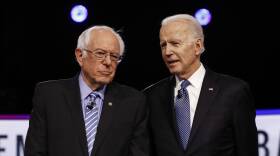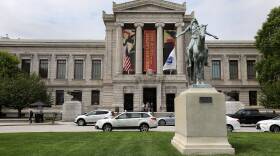EXPLORE MORE
Monday on BPR:
Former Globe Editor Brian McGrory
Emily Norton and Patrick Herron of the Charles and Mystic River Watershed Associations
James Beard-winning cookbook author Dorie Greenspa
Food policy analyst Corby Kummer
Recent segments
-
Bob Thompson: 'Tiger King' Is First Pop Culture Masterpiece In The Age Of Coronavirus
Who is the Tiger King everyone's talking about? -
Trump And Johnson's 'Anti-Globalization' Approach To Coronavirus Crisis
The two leaders share an approach that runs counter to what the world needs, Charlie Sennott says. -
E.J. Dionne Talks 'Code Red,’ And The Divide Within America’s Left
The journalist and author warned that progressive and moderate liberals could "lose together" if they don’t unite to defeat Republicans in the 2020 election. -
Dr. David Katz On A Targeted Response To Coronavirus Pandemic
So leaders are treating the coronavirus pandemic like a war. Should we react with open warfare or surgical strikes? -
MGH Physician Says Hospital Workers Still 'Mostly In Preparation Mode'
To President Trump’s statements downplaying the need for more ventilators, the physician said "I kind of want to scream." -
Jared Bowen: Artistic Institutions Are Starting To Feel Financial Hit Of COVID-19
Like restaurants and movie theaters, most artistic venues have closed their doors and canceled performances.
Listen to previous shows
-

BPR Full Show: Two Buck Chuck
Today on Boston Public Radio: We began the show by asking listeners about the President’s recent claim that the pandemic is “over.” Trenni Casey talked the latest from the WNBA, Robert Sarver’s suspension from the NBA, the niche community of ultramarathoning and the latest Tom Brady happenings. Casey is a reporter and anchor for NBC Sports Boston, and a weekly Boston Public Radio contributor. Suffolk District Attorney Kevin Hayden talked his primary win and the controversial election that led to it, and discussed the future of his office, including the way they will deal with a slew of hate demonstrations in the city, his firing the head of his Juvenile Detention unit, and the MBTA transit police cover up. Corby Kummer talked about the legacy of “Two Buck Chuck” following the death of its creator Fred Franzia, a new energy efficient way to cook pasta, and told us about some notable restaurants in the Boston area. Kummer is executive director of the food and society policy program at the Aspen Institute, a senior editor at The Atlantic and a senior lecturer at the Tufts Friedman School of Nutrition Science and Policy. Jared Bowen talked about the Phantom of the Opera closing on Broadway, and the greater challenges in the theater community after years of COVID-19, and shared his thoughts on “Heroes of the Fourth Turning” at the Speakeasy Stage and “Fabulation,” playing at the Lyric Stage. Bowen is GBH’s executive arts editor and the host of Open Studio. John King talked the latest political headlines, including the reluctance of Republican candidates to accept the results of their respective elections, Former President Donald Trump's recent embrace of QAnon, and Florida Governor Ron DeSantis’ political motives behind his Venezuelan migrant relocation stunt. King is CNN’s chief national correspondent and anchor of “Inside Politics,” which airs weekdays and Sundays at 8am. We ended the show by asking listeners to talk about their memories of “Two Buck Chuck.” -

BPR Full Show: Asylum seekers and world record breakers
Today on Boston Public Radio: We opened the show with a call-in segment and heard from listeners about the migrants on Martha’s Vineyard moving to temporary housing on Cape Cod. Iván Espinoza-Madrigal discussed the relief efforts for the 50 migrants that landed in Martha’s Vineyard and calls for an investigation into the involvement of Florida’s Gov. Ron DeSantis. Iván Espinoza-Madrigal is the Executive Director of Lawyers for Civil Rights in Boston. Andy Borowitz detail the political players and events that inspired his new book, "Profiles in Ignorance: How America's Politicians Got Dumb and Dumber." Andy Borowitz is a New York Times best-selling author, comedian, and news satirist of The Borowitz Report for The New Yorker. Charlie Sennott discussed the international implications of the death of Queen Elizabeth II and the future of nuclear weapons in the war in Ukraine. Charlie Sennott is an analyst for GBH News and the editor, founder, and CEO of The GroundTruth Project. Brian McGrory talked about his new role as chair for the College of Communication journalism program at Boston University and stepping down from his tenure at The Boston Globe. For many years, Brian McGrory worked as a reporter to columnist to Metro editor since 2012 for The Boston Globe. Rev. Irene Monroe and Rev. Emmett G. Price III discussed the passing of Eric Jackson and his legacy as jazz host for GBH, along with the funeral of Queen Elizabeth II, and the migrants of Martha's Vineyard seeking asylum. Revs. Irene Monroe and Emmett G. Price III are co-hosts of the All Rev'd Up podcast on GBH. Henry Swenson shared his planting strategy to compete for the biggest pumpkin at the Topsfield Fair. Henry Swenson is a Guinness World Record holder for his 65-pound butternut squash. We closed the show with a call-in segment and heard from listeners about the conservative dating app ‘The Right Stuff’ and whether listeners would date outside their own political affiliations. -

BPR Full Show: Sept. 16, 2022
This episode of Boston Public Radio is from Friday September 16, 2022. Elle Simone Scott of America’s Test Kitchen shared tips on how to make the perfect food board for hosting. Joanne Chang talks about her latest book inspired by her baking journals, “Pastry Love: A Baker’s Journal of Favorite Recipes.” Billy Collins shares some of his poetry ahead of his June 16 appearance at 2Life Communities’ annual gala. Boston Globe sports reporter Dan Shaughnessy discussed his latest book on the Boston Celtics, “Wish It Lasted Forever: Life with the Larry Bird Celtics.” Chef Christopher Kimball previewed his latest cookbook “Vegetables,” sharing his favorite ways to bring vegetables to the center of the plate. Law professor Rosa Brooks discussed her new book, “Tangled Up In Blue: Policing The American City,” and described her experiences as a reserve police officer in Washington, D.C. Atlas Obscura co-founder Dylan Thuras told stories of strange food from around the world, including psychedelic honey, the anti-masturbatory origins of graham crackers and the great molasses flood in Boston in 1919. Author Susan Orlean previewed her latest book “On Animals.” -

BPR Full Show: Sept. 15, 2022
This is the podcast for BPR’s show on Thursday, September 15, 2022. We started the show with NBC Political Director and moderator of Meet The Press, Chuck Todd. We then turned to Eve Zuckoff, reporter for WCAI, who was on the ground in Martha’s Vineyard, reporting on the dozens of migrants sent to the island by Florida Governor Ron DeSantis. Andrea Cabral, former Massachusetts Secretary of Public Safety and Sheriff of Suffolk County. We wrapped the live portion of our show with incoming Boston Public Schools Superintendent Mary Skipper. The remainder of the show was on tape, featuring Boston Globe reporter Billy Baker on his book “We Need to Hang Out: A Memoir of Making Friends” and Harvard Business School’s Michael Norton on the importance of widening your circle of friends. -

BPR Full Show: The Friendship Show
Today on Boston Public Radio: We opened the show with a conversation with NPR legal affairs correspondent Nina Totenberg on her new book "Dinners with Ruth: A Memoir on the Power of Friendships." Then, we opened the lines to hear from listeners about making friends: at the office, in person and online. For the remainder of the show, we re-aired some of our favorite conversations, including: Charlie Warzel on his book “Out of Office,” coauthored with Anne Helen Peterson, reporter Spencer Buell and noise researcher Erica Walker, about health concerns over rising noise levels in the city, the New Yorker's Malcolm Gladwell about his book, “Talking to Strangers: What We Should Know About the People We Don’t Know," writer Lindy West about her book, “The Witches Are Coming." and Lizzie Post, great-great-granddaughter of etiquette expert Emily Post, about her book “Higher Etiquette: A Guide to the World of Cannabis, from Dispensaries to Dinner Parties.”









